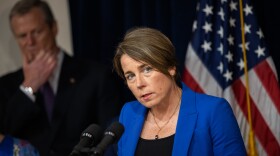COVID-19 continues to put people into the hospital with serious health situations. Testing facilities are backed up, and Boston's proof of vaccination regulations kicked in over the weekend for restaurants, gyms and other indoor venues.
The health board in Northampton, Massachusetts, considered such a requirement last week, and decided not to move forward at this point.
But there are lawmakers calling for a statewide vaccination requirement for some kinds of indoor spaces.
Matt Murphy of the State House News Service says there is a chance a statewide vaccination requirement could gain momentum.
Matt Murphy, State House News Service: If the experiment in Boston works well — and I say experiment loosely, because many other cities around the country have tried this, and have been doing this effectively, New York included — but we've seen a number of cities take similar steps.
Some mayors joined Mayor Michelle Wu when she announced that Boston was going to take this step. We subsequently saw places like Cambridge and Somerville consider, and then decide to postpone, decisions on this. So they'll be watching Boston to see how it works.
The rollout of the state digital vaccine card program is a step in the right direction, helping potentially to make it easier for people and businesses to comply with this.
If it goes smoothly, I think we could see more cities and towns adopt it.
There is some interest in the Legislature, but for now they've deferred to the executive, suggesting that Gov. Charlie Baker is the official most in position and equipped to respond, and put in something like this in place quickly. And so far, the governor has no interest in doing it statewide.
Carrie Healy, NEPM: Boston City Councilor Lydia Edwards will become the first Black woman to serve in the Massachusetts Senate since 2018. Beginning this week, there will be three people of color in the 40-member Senate. On this Dr. Martin Luther King Day, I'm thinking about the speech he delivered to a joint session of the Legislature in April 1965. That was a message of equality and discrimination. With redrawn legislative maps, is the Senate next year likely to better reflect the racial and ethnic diversity of the state?
It's difficult to say, but sometimes it takes time for a district redrawing to really take hold, and deliver the results that the drafters intended.
We saw the Senate redraw districts to include six districts, a doubling from three represented by a majority of minority voters and residents. One of them is in a place where there will be no incumbent, up in the Lawrence area.
But we're probably going to see incumbents run in other districts like the one centered around Brockton — the one centered in Everett, Chelsea, Charlestown and that area. So we may not see the change immediately, but it could come over the next decade.
Over the coming weeks, the Governor's Council is considering commutations for William Allen and Thomas Koonce. They've both been serving life sentences for first degree murder. Gov. Baker approved those commutations last week, making a bit of history. How surprising was Baker's move, and does it foreshadow more clemency announcements before he leaves office a year from now?
In some ways, I think this kind of shows how the governor is very much a process politician. He followed a process that saw these men go before the State Board of Pardons, which is made up of members of the Parole Board. This was recommended to the governor, with extensive descriptions of why it was believed that these men should qualify for parole. He considered it.
I certainly think it was not an easy decision for him, and one that I don't think anyone was sure which way it would go. The governor is not running for reelection, which makes decisions like this slightly more easy. But I think that should the Board of Pardons and members of the Parole Board recommend more commutations, or even pardons, I think this certainly signals that the governor is open to receiving those and considering them, and we could see more before the end of his term.







